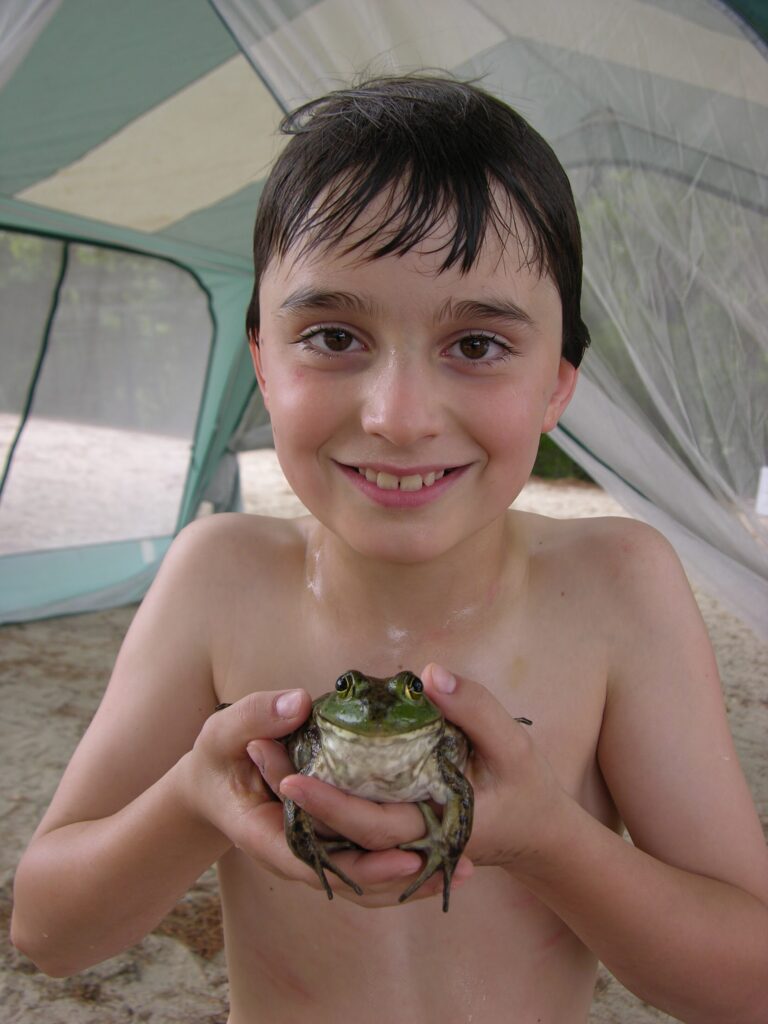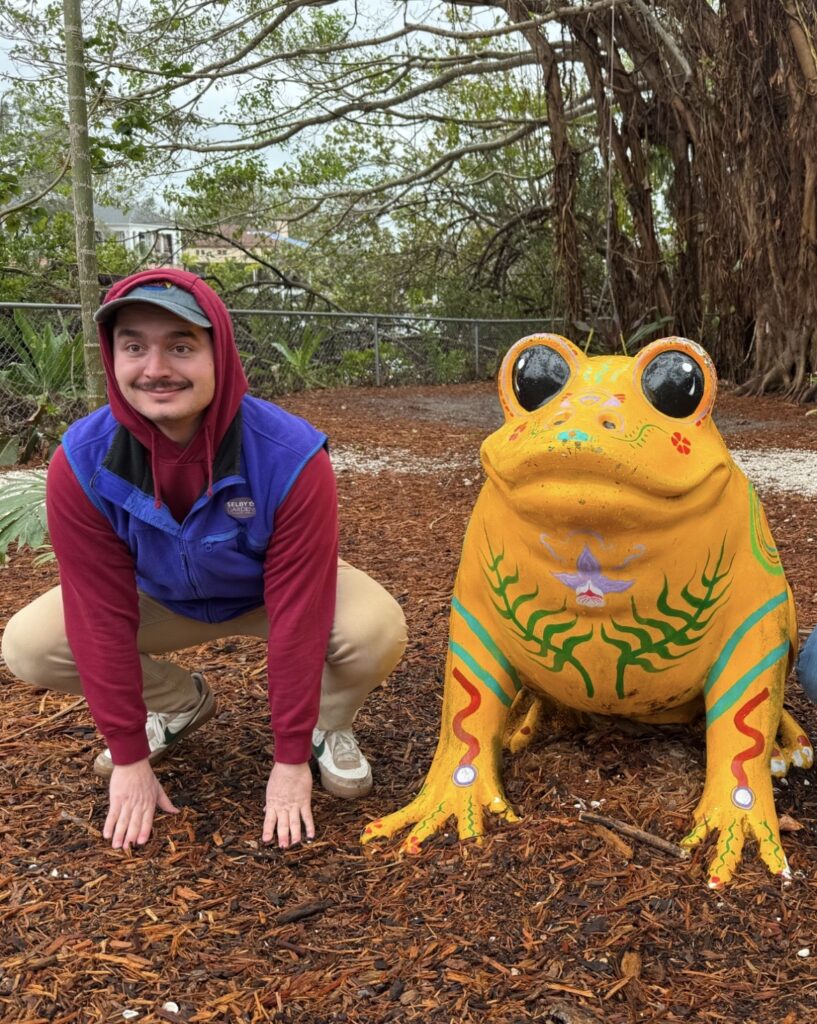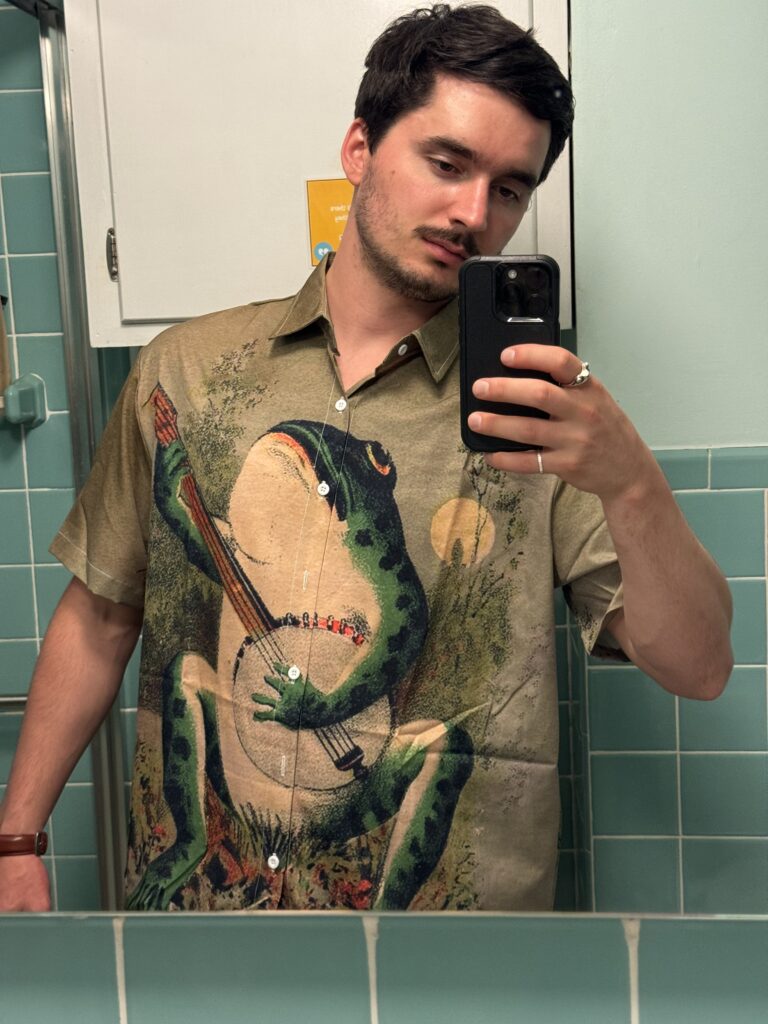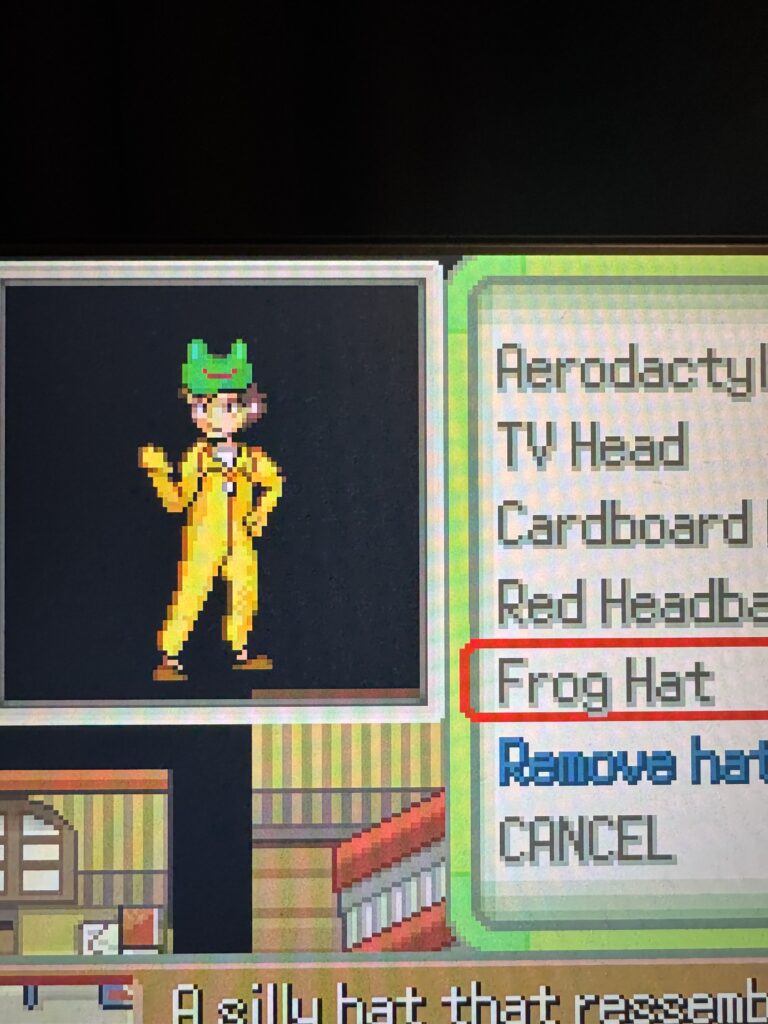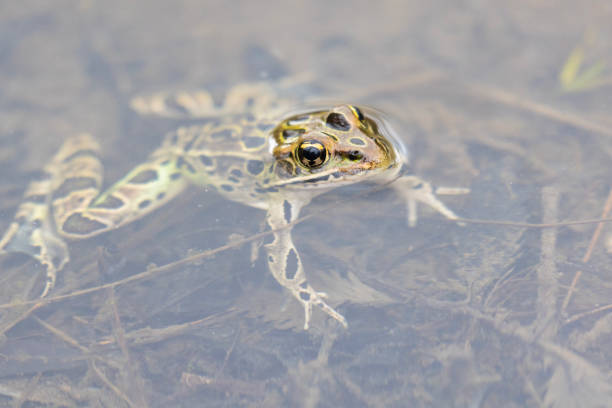
INTERVIEWER: First of all, thank you for taking the time to sit down with us. This is something we’ve been wanting to do for a long time, but technology and the limits of inter-species communication have held us back until now.
LEOPARD FROG: Oh, certainly. I’m glad to be here. We don’t usually give interviews. (Laughs.) But really, we frogs tend to be more observational types. But we’ve always admired your publication. You once ran a piece about Harrison rescuing an injured owl that really captured our imagination.
INTERVIEWER: (Laughs) Yes, I remember that. So nice to run a story with a happy ending.
Really quick before we dig in- something I’ve noticed is, you keep referring to yourself with first-person plural pronouns. I apologize if this is rude in your culture, but would you mind explaining to me why that is?
LF: Of course. We’d be happy to explain. Although not acknowledged or yet confirmed by any human notion of science, leopard frogs experience collective consciousness with all other leopard frogs. We experience memories and feelings as a network. We have for approximately the last 18 million years. Ours is a kind of rhizomatic cognition that resists individualization, so referring to ourselves as “I” or “me” feels…incorrect, and untrue.
INTERVIEWER: But how could this be? No organism in the animal kingdom has ever shown signs of true collective consciousness.
LF: We’re not so sure that’s true. I mean, obviously, we exist. But even among humans, does not a type of collective consciousness arise from the shared beliefs, ideas, and moral attitudes which operate as a unifying force within a society? It is a system endowed with a sui generis reality that is not located in any one individual, but exists above and beyond them, is it not?
You could say normative thought itself represents a social or “shared mind,” a supra-individual consciousness that shapes the behaviors and thoughts of its members. So is it really that much of a stretch to think that other species may have evolved to experience this consciousness internally rather than externally?
INTERVIEWER: Well sure, but–and again, not to be rude–but we have studied the brains of frogs and have found that their brain function, while more simplistic than humans, ultimately shares the same mechanisms.
LF: (Laughs.) Perhaps that’s because humans adhere to a method of science that not only assumes data are transmitted and recorded in a single conceptual currency, but that approaches data with the anticipation that the same laws hold for all data, and that these laws form a single system which tends towards a singular apex. Particularly when it is impossible to prove whether this anticipation is even justified.
Really, humans shouldn’t have been so quick to claim “reason” has universal validity when every species can be expected to have its own adaptive cognitive practices and criteria. No universal set of laws could address the continuum of experience in a nature made up of cognitive diversity and therefore a general relativism.
No wonder your species’ cognitive expansion has been so slow.
INTERVIEWER: I guess I’d never considered those assumptions before. I suppose I concede, and apologize!
LF: (Laughs.) No worries, we’re happy to finally set the record straight.
INTERVIEWER: So if I understand you correctly, what you’re saying is, you can speak to every interaction humans have ever had with leopard frogs over the last 18 million years?
LF: Yes, that is what we are saying.
INTERVIEWER: Fascinating. So, that means you could also speak to every encounter King Hunk has ever had with a leopard frog?
LF: Oh yes. And with great pleasure.
INTERVIEWER: Well then, let’s move on to the meat of our interview!
I alluded to it at the beginning of our chat, but as you know, frogs have long been considered the animal that most represents–and is most beloved by–King Hunk. So, can you tell our readers, how did you first become aware of him?
LF: It was mid-morning. We were sitting just along the edge of his backyard when we felt it—a gaze. Not predatory, not curious in the usual human way. Something closer to reverent, we’d say. And then we saw him: a small toddler, face painted with awe, crawling on all fours and looking at us as if he’d found a cathedral.
He didn’t shout. He didn’t try to grab. He just watched. That was the beginning.
INTERVIEWER: What was it like, being the object of such intense admiration?
LF: Unsettling, at first. We frogs aren’t used to being singled out. We’re background creatures—living punctuation in the long sentence that is our ecosystem. But Harrison looked at us as if we were the whole paragraph. It made us almost self-conscious. We started croaking with more precision. We adjusted the way we sat. Things like that. But admiration, when it’s sincere, doesn’t inflate you—it reveals you. Harrison didn’t want us to perform. He just wanted to be near something he loved.
INTERVIEWER How would you describe Harrison’s presence as a young boy?
LF: Gentle. Curious. Usually a little damp. He had this way of moving that didn’t ripple bodies of water too much. We don’t often see that in young humans. Most of them tromp and shout and think everything belongs to them. But Harrison—well, he could be like that sometimes. But he was usually considerate.
INTERVIEWER: What do you think he sees in you?
LF: We’ve thought about that. We think, in us, Harrison sees his favorite version of himself, the one that doesn’t have to prove anything to anyone. We leap without hesitation. We vanish into water with elegance or a loud splash–whatever we feel. We exist entirely in the present.
INTERVIEWER: Has his admiration changed you as leopard frogs in any way?
LF: We think it has. It makes us feel witnessed, which is different from being seen. “Seen” can be passive, even accidental. “Witnessed” means someone is holding you in their mind with care. Harrison did–does–that with us. We try to return that kindness back to him in small ways.
For instance, when we croak, we think about harmony in the way we think Harrison might. We have at times tucked ourselves underneath his window to listen to him play piano and sing.
INTERVIEWER: And what do you think Harrison has learned from you?
LF: Hard to say as we’ve never talked to him personally, as much as we’d leap at the opportunity (laughs).
INTERVIEWER: (Laughs.)
LF: Maybe he’s learning…that affection doesn’t have to be reciprocal in form in order to be real in substance. I mean, we’ve never croaked his name. We’ve never posed for his pictures. But we’ve been there for him—steady as a shadow, persistent as his sweat glands in the summer heat.
INTERVIEWER: Would you call your connection with Harrison a friendship?
LF: We would call it a devotion. Friendship implies a kind of equality–shared language and mutual exchange. We don’t have that, really. But there’s certainly something old and familiar and shared between us. Like the moon and the tide. He watches. We live. And somehow, we move each other.
And with Harrison, we also gained a legacy outside ourselves: Fond memories. An occasional friendly ripple at the edge of our ponds. A closet full of clothes and a drawing in an apartment bedroom. That means something, even if only to us.
INTERVIEWER: Before sitting down with you, we asked Harrison what’s the one thing he would say to leopard frogs if he could. He said, “You will always be safe in my hands.” If you could say one thing directly to Harrison, what would it be?
LF: That’s so sweet of him. We don’t usually like to be picked up and held so that’s comforting.
We would say don’t lose the mustache, it really suits you. (laughs). No really, we would say… thank you. For loving us when most of your kind do not.
INTERVIEWER: And what do you think of his theory that people are either a “frog person” or a “rat person,” and that the best relationships are between rats dating frogs.
LF: (Laughs.) It’s certainly interesting. We’ve never dated a rat personally, but we certainly think Harrison is a “frog person.”
INTERVIEWER: Last question: what’s it like to be someone’s favorite?
LF: It’s affirming. We don’t leap any higher. We don’t croak any louder. But we feel it in our bones—that somewhere, someone believes we matter a whole lot. That our slimy physical existence—our breaths, our blinks, our waiting—are enough to inspire wonder. That’s more than most frogs ever hope for.
